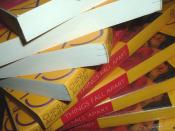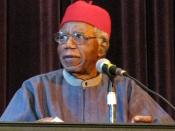"The dread of evil is a much more forcible principle of human actions than the prospect of good," said one of the wisest enlightenment thinkers, John Locke. This perspective of evil being represented by human actions is thoroughly shown in the novel Thing's Fall Apart by Chinua Achebe. The good and evil in this novel are both represented by Okonkwo because although he means well, his actions contradicts his good intentions. Because his violent, evil action disregards his good intentions, evil eventually wins.
Okonkwo is a concerned and loving father, even thou he often does not show it. When Ekweifi gets abducted by the priestess, Okonkwo goes to the shrine three times and gets "gravely worried" (112) about his daughter. The day after Ekweifi's abduction, Okonkwo was "feeling tired, and sleepy, for although nobody else knew it, he had not slept at all last night" (112). This shows that he is genuinely a good man who cares about his family and gets "very anxious" when one of them is in any sort of trouble.
He loved his family but he did not want other people to know that his family was his weakness.
In other hand, Okonkwo's fear of what society may think forced him to take certain actions against his children. In the beginning, Okonkwo kills his adopted son Ikemefuna, because "He was afraid of being thought weak" (61). Even thou he loved Ikemefuna, which he proved by "not [tasting] any food for two days after the death of Ikemefuna." (63), his evil action contradicted his affection for him.
Good intentions do not always lead to pleasant actions. Sometimes what one wants to do and what one ends up doing contradict each other. Often in Okonkwo's case, the result of his actions led to disaster rather...


